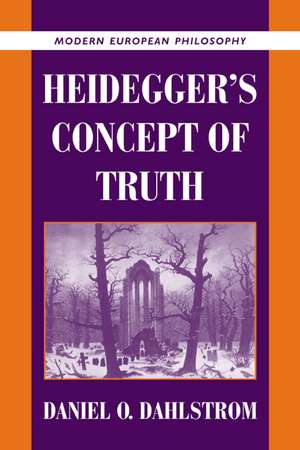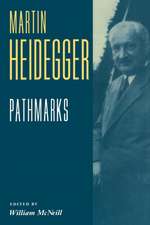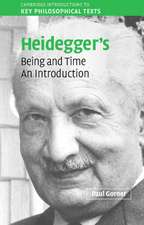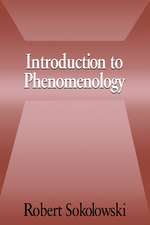Heidegger's Concept of Truth: Modern European Philosophy
Autor Daniel O. Dahlstromen Limba Engleză Hardback – 3 dec 2000
| Toate formatele și edițiile | Preț | Express |
|---|---|---|
| Paperback (1) | 281.99 lei 6-8 săpt. | |
| Cambridge University Press – 18 mar 2009 | 281.99 lei 6-8 săpt. | |
| Hardback (1) | 873.19 lei 6-8 săpt. | |
| Cambridge University Press – 3 dec 2000 | 873.19 lei 6-8 săpt. |
Din seria Modern European Philosophy
-
 Preț: 102.23 lei
Preț: 102.23 lei -
 Preț: 193.16 lei
Preț: 193.16 lei -
 Preț: 192.64 lei
Preț: 192.64 lei -
 Preț: 195.52 lei
Preț: 195.52 lei -
 Preț: 296.69 lei
Preț: 296.69 lei -
 Preț: 233.56 lei
Preț: 233.56 lei -
 Preț: 273.11 lei
Preț: 273.11 lei -
 Preț: 279.86 lei
Preț: 279.86 lei -
 Preț: 370.56 lei
Preț: 370.56 lei -
 Preț: 333.43 lei
Preț: 333.43 lei -
 Preț: 441.96 lei
Preț: 441.96 lei -
 Preț: 289.40 lei
Preț: 289.40 lei -
 Preț: 312.27 lei
Preț: 312.27 lei -
 Preț: 409.33 lei
Preț: 409.33 lei - 14%
 Preț: 764.18 lei
Preț: 764.18 lei -
 Preț: 275.63 lei
Preț: 275.63 lei -
 Preț: 214.21 lei
Preț: 214.21 lei - 11%
 Preț: 548.33 lei
Preț: 548.33 lei -
 Preț: 327.20 lei
Preț: 327.20 lei -
 Preț: 406.83 lei
Preț: 406.83 lei -
 Preț: 423.35 lei
Preț: 423.35 lei -
 Preț: 286.63 lei
Preț: 286.63 lei -
 Preț: 362.87 lei
Preț: 362.87 lei - 11%
 Preț: 487.63 lei
Preț: 487.63 lei -
 Preț: 344.99 lei
Preț: 344.99 lei - 11%
 Preț: 552.94 lei
Preț: 552.94 lei - 11%
 Preț: 643.05 lei
Preț: 643.05 lei -
 Preț: 458.83 lei
Preț: 458.83 lei -
 Preț: 445.71 lei
Preț: 445.71 lei -
 Preț: 310.75 lei
Preț: 310.75 lei -
 Preț: 445.34 lei
Preț: 445.34 lei - 11%
 Preț: 459.31 lei
Preț: 459.31 lei - 11%
 Preț: 647.01 lei
Preț: 647.01 lei -
 Preț: 365.22 lei
Preț: 365.22 lei -
 Preț: 243.55 lei
Preț: 243.55 lei - 11%
 Preț: 552.94 lei
Preț: 552.94 lei -
 Preț: 429.91 lei
Preț: 429.91 lei -
 Preț: 404.09 lei
Preț: 404.09 lei
Preț: 873.19 lei
Preț vechi: 1015.34 lei
-14% Nou
Puncte Express: 1310
Preț estimativ în valută:
167.14€ • 181.61$ • 140.49£
167.14€ • 181.61$ • 140.49£
Carte tipărită la comandă
Livrare economică 21 aprilie-05 mai
Preluare comenzi: 021 569.72.76
Specificații
ISBN-13: 9780521643177
ISBN-10: 0521643171
Pagini: 496
Dimensiuni: 165 x 238 x 33 mm
Greutate: 0.89 kg
Editura: Cambridge University Press
Colecția Cambridge University Press
Seria Modern European Philosophy
Locul publicării:New York, United States
ISBN-10: 0521643171
Pagini: 496
Dimensiuni: 165 x 238 x 33 mm
Greutate: 0.89 kg
Editura: Cambridge University Press
Colecția Cambridge University Press
Seria Modern European Philosophy
Locul publicării:New York, United States
Cuprins
Introduction; 1. The logical conception of truth: the logical prejudice and Lotze's concept of validity; 2. The phenomenological conception of truth; 3. The hermeneutic understanding of truth: the critical appropriation of Aristotle's analysis of truth and assertions; 4. The timeliness of existential truth: disclosing the sense of being; 5. Disclosedness, transcendental philosophy and methodological deliberations; Index.
Recenzii
"[Dahlstrom's] treatment of the logical implications of Heidegger's philosophy is very detailed and systematic..." American Philosophical Association
"...ambitious, learned, and highly informative contribution to the interpretation of Heidegger's philosophy..." The Thomist
"Daniel Dahlstrom has written a highly accomplished and detailed scholarly account of the scope and consequences of Heidegger's radical engagement during the 1920s with 'the logical prejudice,' that is, the assumption 'that assertions and their kin are the site of truth'.... Dahlstrom's study does an impressive job of presenting Heidegger's early conception of truth more clearly and completely than any other study to date. It also provides an illuminating account of how Heidegger's project both diverges from and remains close to Husserl's phenomenology. It is a solid piece of scholarship that should be widely read and discussed by scholars, critics, and students of Heidegger." The Journal of Speculative Philosophy
"Anyone trying to understand Heidegger's doctrines regarding truth and logic - and the implications of those doctrines for the often problematic status of Heidegger's own philosophical enterprise - will find this book highly rewarding." The Philosophical Review
"Fried makes an important contribution...it is important that this study is now available...A major philosophical study of the early Heidegger." Albion
"...an excellent piece of work--well written, well argued and well supported. It is a significant contribution to the increasing body of scholarly literature concerning the development of Heidegger's early thought." - International Studies in Philosophy
"...ambitious, learned, and highly informative contribution to the interpretation of Heidegger's philosophy..." The Thomist
"Daniel Dahlstrom has written a highly accomplished and detailed scholarly account of the scope and consequences of Heidegger's radical engagement during the 1920s with 'the logical prejudice,' that is, the assumption 'that assertions and their kin are the site of truth'.... Dahlstrom's study does an impressive job of presenting Heidegger's early conception of truth more clearly and completely than any other study to date. It also provides an illuminating account of how Heidegger's project both diverges from and remains close to Husserl's phenomenology. It is a solid piece of scholarship that should be widely read and discussed by scholars, critics, and students of Heidegger." The Journal of Speculative Philosophy
"Anyone trying to understand Heidegger's doctrines regarding truth and logic - and the implications of those doctrines for the often problematic status of Heidegger's own philosophical enterprise - will find this book highly rewarding." The Philosophical Review
"Fried makes an important contribution...it is important that this study is now available...A major philosophical study of the early Heidegger." Albion
"...an excellent piece of work--well written, well argued and well supported. It is a significant contribution to the increasing body of scholarly literature concerning the development of Heidegger's early thought." - International Studies in Philosophy
Descriere
This major study of Heidegger is the first to examine in detail the concept of existential truth that he developed in the 1920s.

















